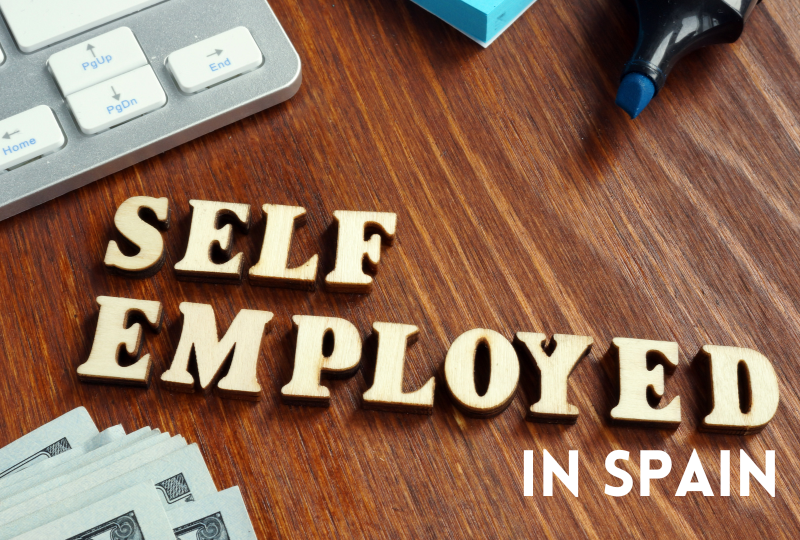How to Become an Autónomo (self-employed) in Spain

Understanding the Concept of an Autónomo
Becoming an autónomo (self-employed) in Spain signifies taking on the role of a self-employed individual. This status encompasses a broad spectrum of professionals, ranging from freelancers and small business owners to various independent contractors. The legal framework governing autónomos is established to provide a structured environment for these individuals to operate their businesses independently, offering both opportunities and responsibilities distinct from traditional employment.
In Spain, an autonomo is defined as a person who regularly, personally, and directly carries out an economic activity for profit, without being subject to an employment contract. This definition includes a range of professionals such as consultants, artists, tradespeople, and more. The types of autónomos can be categorized primarily into freelancers, who offer specialized services; self-employed individuals, who may operate as solo entrepreneurs; and small business owners, who might employ other workers while running their enterprises.
The benefits of working as an autónomo are manifold. One of the primary advantages is the autonomy it offers. Self-employed individuals can set their schedules, choose their projects, and have the potential to earn more based on their efforts and success. Additionally, there are various tax deductions available to autonomos that can be utilized to reduce taxable income. Moreover, the flexibility of being self-employed can lead to a more balanced work-life arrangement, particularly for those who value independence in their professional lives.
However, there are also notable drawbacks. Autónomos in Spain must navigate a complex bureaucratic process to register and operate legally. They are responsible for managing their taxes, social security contributions, and other administrative obligations, which can be time-consuming and require a good understanding of the Spanish legal system. Furthermore, the financial stability of being an autónomo can be uncertain, as income may fluctuate and there is no guarantee of regular work or benefits such as paid leave or retirement plans.
Overall, becoming an autonomo in Spain presents a unique set of opportunities and challenges. Understanding the legal framework and the implications of this status is crucial for anyone considering this path to ensure they are well-prepared for the responsibilities that come with self-employment.
Legal Requirements and Documentation
Embarking on the journey to become an autonomo in Spain involves navigating several legal prerequisites. The first step is to obtain a NIE (Número de Identificación de Extranjero), which is an essential identification number for foreigners conducting economic activities in Spain. This can be acquired at the local police station or through a Spanish consulate abroad. The process requires you to fill out an application form, provide a valid passport, and sometimes a justification for why you need a NIE.
Once you have your NIE, the next step is to register with the Spanish Social Security System (Seguridad Social). This registration is crucial as it enables you to access healthcare and other social services. You will need to visit your local Social Security office with your NIE, passport, and completed application form (TA.0521). After registering, you will receive a social security number, which is necessary for all subsequent steps.
The final major step is to sign up at the tax office (Agencia Tributaria). Here, you will need to declare your intention to work as a self-employed individual by presenting your NIE, social security number, and a completed “Modelo 036” or “Modelo 037” form. These forms are essential for tax purposes and will determine what tax you pay and what deductions you may be eligible for.
To streamline these processes, it is advisable to keep all your documents organized and make multiple copies. Additionally, the costs involved include a registration fee for the NIE, which varies depending on where you apply, and the monthly social security contributions, which generally start at around €300 but can be reduced during the first few years of your activity as a self-employed person in Spain.
It must be added that there have recently been some big changes to social security contributions in Spain.
Navigating the bureaucratic maze can be daunting, but with proper preparation and organization, becoming an autónomo in Spain can be a smooth process. Following these steps ensures that you comply with all legal requirements and sets a solid foundation for your self-employed venture.
Setting Up Your Business and Financial Obligations
Establishing yourself as an autonomo in Spain involves several critical steps that ensure your business is legally compliant and financially sound. First, you need to determine the appropriate business structure. Most self-employed individuals in Spain operate as sole proprietors, but other structures, such as partnerships or limited liability companies, may be suitable depending on your business goals and risk tolerance.
Once you have decided on the business structure, the next step is to register your business name. This process involves submitting your chosen name to the Registro Mercantil Central (Central Commercial Registry) to ensure it is unique and not already in use. Upon approval, you will receive a certificate confirming the registration of your business name.
Setting up a dedicated business bank account is crucial for managing your finances effectively. A business bank account helps segregate personal and business expenses, making it easier to track income and expenditures. Most Spanish banks offer specialized accounts for autónomos, which often come with additional services such as online banking and financial advice tailored to self-employed individuals.
As an autonomo in Spain, you are subject to several financial obligations. One of the most significant is the monthly social security contribution. This payment covers your health insurance and contributes to your future pension. The amount varies based on your income and chosen contribution base, but a minimum monthly payment is required regardless of earnings.
Additionally, autonomos must file quarterly VAT (IVA) returns if they provide taxable goods or services. This involves calculating the VAT collected from clients and deducting any VAT paid on business expenses. The net amount is then either paid to or refunded by the tax authorities. Annual income tax filings are also mandatory, where you report your total earnings and calculate the tax owed based on Spain’s progressive tax rates.
Effective record-keeping and accounting practices are essential for managing these financial obligations. Maintaining accurate records of all income and expenses, including receipts and invoices, will facilitate the preparation of tax returns and ensure compliance with Spanish tax laws. Many autonomos opt to hire an accountant or use specialized accounting software to streamline this process.
Navigating Challenges and Leveraging Resources
Becoming an autónomo in Spain comes with its unique set of challenges. From fierce market competition to the unpredictability of client acquisition and financial instability, autónomos must navigate a complex landscape. Understanding these common hurdles and leveraging available resources can significantly enhance your chances of success.
Market competition is a prevalent concern for many self-employed individuals in Spain. To stand out, it is crucial to identify your unique selling points and effectively market them. Building a robust online presence through a professional website and active social media profiles can attract potential clients. Networking, both online and offline, is also essential. Joining local business networks and attending industry events can open doors to new opportunities and collaborations.
Client acquisition can be another significant challenge. Diversifying your client base can mitigate the risk of dependency on a single source of income. Platforms such as Upwork, Freelancer, and LinkedIn can be invaluable in finding freelance work. Additionally, maintaining a high standard of service and fostering strong relationships with existing clients can lead to repeat business and word-of-mouth referrals.
Financial instability is often a concern for autonomos, given the irregular nature of freelance income. Effective financial management, including budgeting and setting aside savings for leaner periods, is critical. Spain offers various government grants and subsidies aimed at supporting autonomos. Researching and applying for these can provide financial relief and stability.
Moreover, Spain’s autónomos can benefit from business networks and associations that offer resources and support. Organizations such as ATA (Asociación de Trabajadores Autónomos) provide guidance, advocacy, and networking opportunities. Taking advantage of these resources can offer valuable insights and support.
Maintaining a work-life balance is essential for long-term success. Setting clear boundaries between work and personal life, scheduling regular breaks, and dedicating time for hobbies and relaxation can prevent burnout. Adopting time management techniques, such as the Pomodoro Technique or time blocking, can enhance productivity and ensure a balanced lifestyle.
In conclusion, while the path to becoming a successful autónomo in Spain is fraught with challenges, strategic planning and the utilization of available resources can pave the way for a rewarding freelance career.
RELATED POSTS
View all


